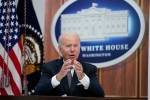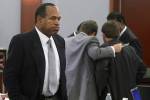Chill pills may not cure this case of road rage
Bill Clinton compared the 2016 election to a bad case of road rage.
“There’s a lot of road rage out there,” Clinton said. “We don’t need to feed our road rage, we need to slow the car down and think about our future.”
Clinton’s remarks came during a speech at the College of Southern Nevada’s Cheyenne campus, where he was filling in for Hillary Clinton as she recovered from a case of pneumonia. (Bill Clinton inaccurately called it “the flu” during his speech.)
His choice of metaphor was not accidental: Road rage is an intense feeling, brought on when a person feels he or she has been wronged by the carelessness or intentional malice of another.
If there’s one thing that’s true of 2016’s electorate, it’s this: There is a lot of anger out there. Supporters of Bernie Sanders are angry that most of the new wealth accumulates at the top of the income scale. Supporters of Donald Trump are angry that the government hasn’t properly dealt with issues such as immigration reform or trade policy. Supporters of Hillary Clinton are angry that her poll numbers have fallen.
It’s most definitely not a conventional election.
Which is why it was odd that Clinton — who everyone must acknowledge is one of the most astute observers of the mood of the American electorate in modern times — gave such a conventional reply to Trumpism.
Bill Clinton dutifully outlined Hillary Clinton’s approach to the economy — infrastructure spending, relieving student debt, comprehensive immigration reform and tax breaks for companies that create domestic jobs. He even had a nifty contrast between his wife’s approach and Trump’s: “The worst thing we can do is spend that money on a wall that we could spend on bridges.” Metaphorically and literally! Nicely done, Mr. President.
But then Bill Clinton got to the meat of the difference between the two candidates.
“We need to learn to live together,” Clinton said. “This election’s about you. Our children, our grandchildren, and our ability to rise together again.”
He depicted the American social strata as a totem pole, with various groups struggling to move up a peg or two at the expense of those who already occupy a higher rank. “What Hillary wants to do is tear the totem pole down and let us all move forward together,” he said, adding later, “That slogan of Hillary’s [“stronger together”] is not a slogan. For her, it’s a way of life.”
Yes, by all means, insert your own joke about the irredeemable basket of deplorables here.
This election, Bill Clinton went on to say, is about hope and not fear, about what we have in common versus what divides us, and about finding a way to live together with shared peace and prosperity.
Sound familiar? Clinton has said very similar things during previous elections. There may even be T-shirts with the ex-president’s favorite slogan, elections are always about tomorrow, not yesterday.
True enough. But road rage can be a powerful thing, and it can lead to very bad decisions with long-term consequences. People in that frame of mind are in no mood to slow the car down and think. They’re focused on the injury they’ve suffered, and demanding justice in its aftermath.
That’s the message Donald Trump is talking about, the fire he’s bellowing into a full-fledged, five-alarm conflagration.
And get this: In some cases, road rage is actually justified. Its legitimate victims don’t want to be told to calm down; they want to be told that the other guy is a jerk who doesn’t deserve a license.
In America’s least conventional election in decades, a conventional message may not do the trick. Or, to put it another way, people may just have stopped thinking about tomorrow.
Steve Sebelius is a Review-Journal political columnist. Follow him on Twitter (@SteveSebelius) or reach him at 702-387-5276 or SSebelius@reviewjournal.com.




























